
A photo of the PlantPills Whole-Food Spermidine. For more photos, please see the desktop version of this page here.
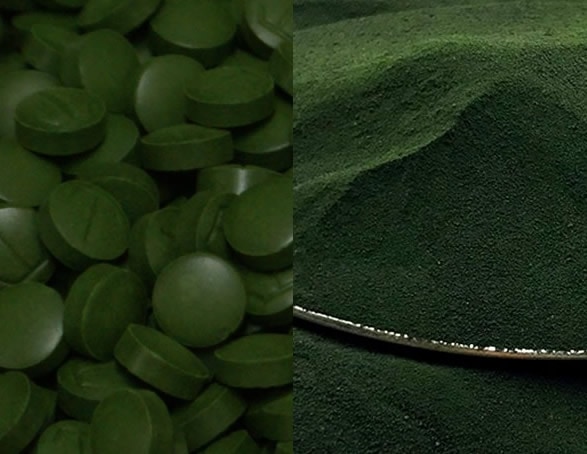
Spermidine is the most abundant polyamine in the body[1], and is essential for tissue regeneration, cell growth and cell proliferation. Spermidine is also critical to the processes involved in controlling apoptosis, learning and memory, and binds to and stabilizes RNA and DNA, modulates enzyme functions, preserves and enhances mitochondrial metabolic function and respiration, and has anti-inflammatory properties and antioxidant functions[2,3,4,5,10].
Spermidine is also a natural inducer of autophagy[6], a cytoprotective self-digestive process that assists in removing and recycling damaged and potentially harmful cytoplasmic material that otherwise would accumulate during aging, and is key to health and longevity[7,10].
Spermidine is naturally found in foods such as green peas, chickpeas, cauliflower, broccoli, mushroom and mango in amounts ranging from 25 to 90 mg/kg. Amounts in cheddar cheese, soybean and wheat germ range from 200 to 250 mg/kg[8,9]. The majority of spermidine in standard diets comes from whole grains, apples, pears, salad, vegetable sprouts and potatoes[10].
PlantPills Whole-Food Spermidine has by far the highest spermidine content of any whole food, independently verified to contain approximately 900 mg/kg (0.9mg per gram).
The average person is estimated to consume approximately 10 mg per day[10], though this varies from around 7mg to 25mg or more, with the highest amounts present in the Mediterranean diet, often associated with good health and longevity[19,20,21].
A large human study published in 2018, conducted on 829 people over a 20 year period, found that people with a diet rich in spermidine had an increased survival rate equivalent to 6 years over those with less dietary spermidine[10].
The study analysed 146 nutrients, and found spermidine to have the strongest link of any nutrient to increased survival.
These findings were independently validated in a second study, with the diets and mortality of 1,770 healthy unrelated people analysed[10-supp.tab.9].
This corroborates previous studies that found spermidine supplementation significantly increased lifespan in yeast (40-150%), worms (10-15%), flies (15-20%) and mice (10-25%)[11,12,13].
Tissue spermidine concentrations decline with age[14,15,16,17], which may in part be due to a decline in the biosynthetic activities of polyamine-producing enzymes as they become less efficient[18]. Interestingly, the age-related decline in spermidine levels doesn’t occur in naked mole-rats, that live 10 times longer than other rodent species of the same size[43].
It has been theorised that because the body produces sufficient spermidine during youth, but not in old age, that spermidine evolves to the status of a vitamin and should be supplemented for health maintenance[44].
Spermidine’s ability to induce autophagy[6] accounts for many of the health-promoting effects, due to the key role that autophagy plays in the cellular and molecular mechanisms involved in immune modulation, cardio-protection, neuro-protection, stem cell function and ageing[22,31]. Alternative mechanisms of action that may be autophagy-independent are direct antioxidant and metabolic effects on increased arginine bioavailability and nitric oxide production[22], and the MAPK pathway[45].
Spermidine is classified as a caloric restriction mimetic (CRM)[22]. Calorie restriction (CR) is the chronic reduction of calorie intake without malnutrition, which appears to extend life and be beneficial to health[23,24], due in part to the activation of autophagy to maintain proper cell function and promote cell survival under the stress condition of nutrition deficiency[25].
CRMs potentially mimic the benefits associated with caloric or dietary restriction, in part by inducing autophagy[26].
Another CRM, resveratrol, induces autophagy by indirectly activating the “anti-aging” sirtuin enzyme SIRT1[27], whereas spermidine primarily induces autophagy through inhibition of the acetyl transferase EP300. EP300 promotes the activity of mTORC1 (autophagy-inhibitory mechanistic target of rapamycin complex 1). Inhibition of EP300 primarily results in autophagy-relevant cytosolic protein deacetylation. Sustained autophagic control by spermidine is mediated through induction of autophagy relevant gene transcription. This involves the regulation of FOXO transcription factor as well as inhibition of histone acetyl transferases, resulting in epigenetic transcriptional reprogramming[22].
Spermidine causes mTORC1 inhibition, but also activates phosphorylation of 5′ adenosine monophosphate-activated protein kinase (AMPK), which may further facilitate autophagic response by antagonizing mTORC1 at the functional level[41].
The combination of spermidine and resveratrol has shown synergistic effects on autophagy induction[28], likely due in part to them initially activating autophagy via different mechanisms.
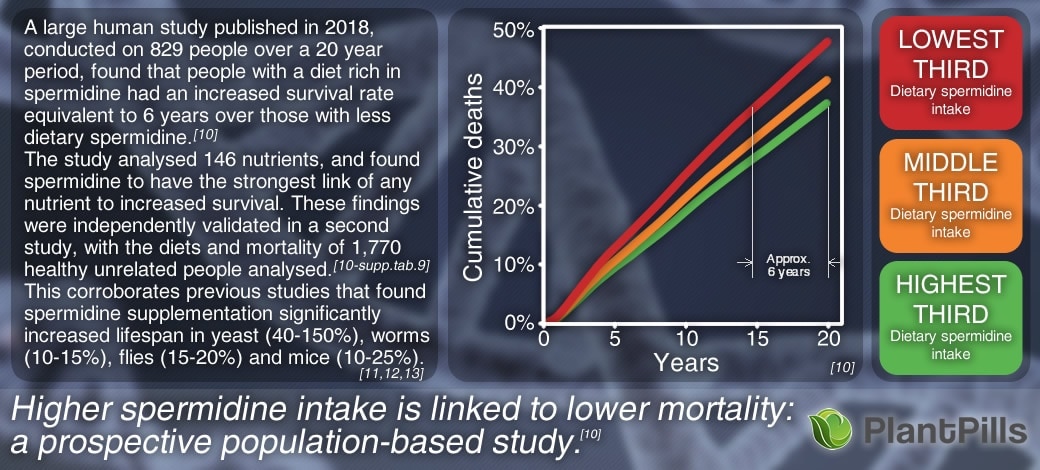
Spermidine concentrations in the body decline with age[14,15,16,17], and increasing dietary spermidine may decrease mortality and increase lifespan, as indicated by studies on humans[10], yeast, worms, flies and mice[11,12,13].
In addition to noting that spermidine levels decline with age, a cross-sectional observational study found that healthy individuals in their 90s and 100s have higher spermidine levels, similar to those found in younger, middle-aged people[29].
Low spermidine content in breast milk and infant formula has been linked with a higher chance of the child developing food allergies. Spermine content in milk lower than 2 nmol/ml results in an 80% chance of the child developing a food allergy, with the change reduced to 0% with concentrations higher than 13 nmol/ml[30].
In flies, dietary supplementation of spermidine delayed age-associated memory impairment[32], and prevented motor impairment that was elicited by transgenic expression of human α-synuclein[33].
In mice, dietary supplementation of spermidine protected mice from TAR DNA-binding protein TARDBP also known as TDP-43 associated proteinopathies[34], in line with the general neuro-protective action of spermidine.
Apart from extending the lifespan of mice, it exerts cardioprotective effects, reducing cardiac hypertrophy and preserving diastolic function in old mice. Spermidine feeding enhanced cardiac autophagy, mitophagy and mitochondrial respiration, and it also improved the mechano-elastical properties of cardiomyocytes in vivo, coinciding with increased titin phosphorylation and suppressed subclinical inflammation[35].
In Dahl salt-sensitive rats that were fed a high-salt diet (a model for hypertension-induced congestive heart failure), spermidine feeding reduced systemic blood pressure, increased titin phosphorylation and prevented cardiac hypertrophy and a decline in diastolic function, thus delaying the progression to heart failure[35].
Spermidine supplementation in mice also resulted in reduced liver fibrosis and HCC foci[12], and acted as a sleep aid, reversing the age-related lengthening of the circadian period, and modulated the interaction between core-clock genes Cryptochrome Circadian Regulator 1 (CRY1) and Period Circadian Regulator 2 (PER2)[36].
In cultured human hair follicles, spermidine has been found to be a potent stimulator of human hair growth and a modulator of human epithelial stem cell biology[42].
In humans, high levels of dietary spermidine correlate with reduced blood pressure and lower incidence of cardiovascular disease[35].
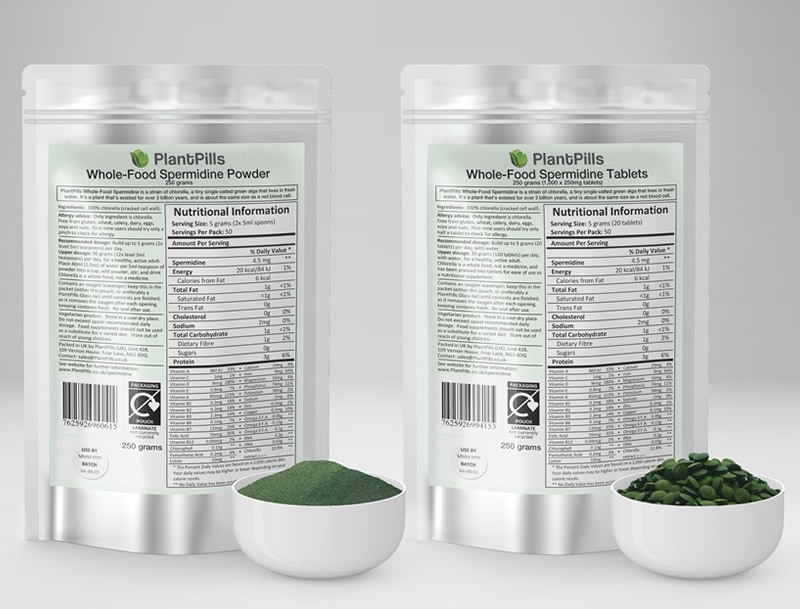
Pure spermidine is classified as a research chemical, and cannot be used for human consumption, so spermidine can only be supplemented via whole food or extract sources.
PlantPills Whole-Food Spermidine has by far the highest spermidine content of any whole food, independently verified to contain approximately 900 mg/kg (0.9mg per gram). The spermidine content test certificate from the third-party laboratory for the current batch can be seen below.
PlantPills Whole-Food Spermidine is a specific strain of chlorella, a tiny single-celled green alga that lives in fresh water. It's a plant that is about the same size as a human red blood cell, and has existed on earth for over 3 billion years.
Chlorella is very well studied in humans and animals, and is a dietary staple in some parts of the world, with over 7 million people in Japan consuming chlorella on a daily basis.
Our significant experience and expertise with alga has enabled us to cultivate specific strains, that when grown in the correct conditions[46], result in the highest whole-food source of spermidine in the world.
Every batch of PlantPills Whole-Food Spermidine is independently verified to have a spermidine content of approximately 900mg per kg, with no dangerous levels of heavy metals or micro-organisms. Every single batch is thoroughly tested in-house to confirm the absence of BMAA/microcystin. The certifications for the current batch are viewable below. The current batch of our Whole-Food Spermidine has a spermidine content of 860 mg per kg.
PlantPills Whole-Food Spermidine comes in powder or 250mg tablets. Pack sizes are 250 grams, 500 grams, 1 kilogram, 2 kilograms and 10 kilograms (selectable in the basket).
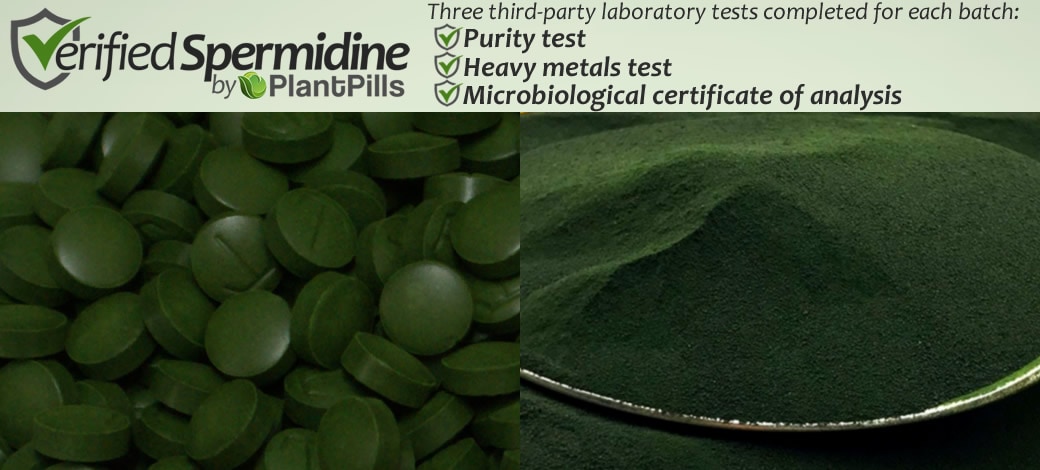
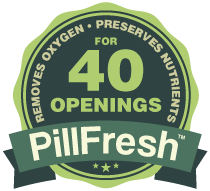 PlantPills Whole-Food Spermidine is a specific strain of chlorella, and it is imperative that chlorella is transported and stored in an oxygen-free environment, even after opening. If chlorella is exposed to oxygen, the nutritional value quickly starts to diminish, because vitamins, enzymes and antioxidants are particularly sensitive to oxygen.
PlantPills Whole-Food Spermidine is a specific strain of chlorella, and it is imperative that chlorella is transported and stored in an oxygen-free environment, even after opening. If chlorella is exposed to oxygen, the nutritional value quickly starts to diminish, because vitamins, enzymes and antioxidants are particularly sensitive to oxygen.
PlantPills Whole-Food Spermidine is supplied in our unique PillFresh™ packaging, which keeps the contents sealed in an environment with an oxygen content of less than 0.1%. After you open your PlantPills Whole-Food Spermidine, just seal it back up, and incredibly, our unique PillFresh™ packaging will again reduce the oxygen content to less than 0.1%, continuing to keep the contents fresh.
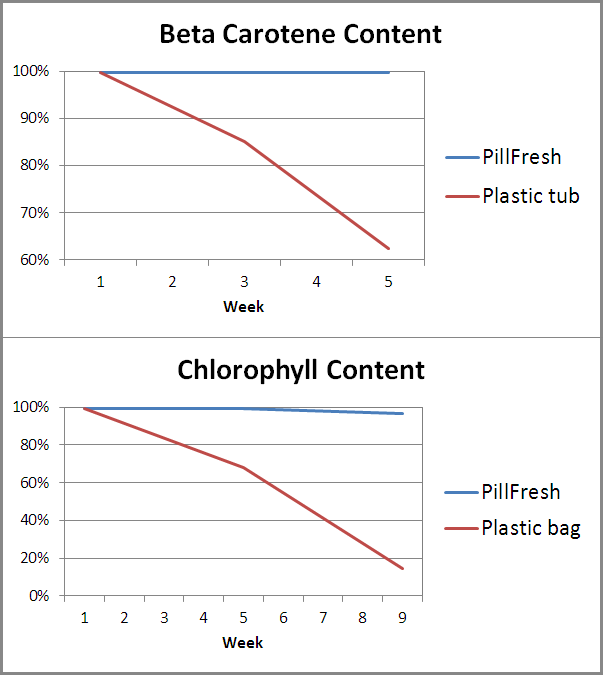
This packaging will continue to do this time and time again, for 40 openings.
Other vendors package these types of materials in plastic tubs, or "vacuum sealed" aluminium pouches. Plastic tubs are permeable to oxygen, so are no use for keeping the contents fresh. Tablets in aluminium pouches are difficult to vacuum seal, and this type of vacuum sealing typically contains at least 2% oxygen. This is enough oxygen to start diminishing the nutritional value, and considering mould can grow in air with a 0.3% oxygen content, this really isn't acceptable.
It is therefore pretty certain that a significant amount of nutrition is lost before a typical package of chlorella is even opened by the consumer. Then, after opening, the exposure to oxygen quickly starts to diminish the nutritional value further. While our PillFresh packaging maintains 100% (or very close to 100%) of the nutrients, typical packaging will result in a 37% loss in beta carotene content after four weeks, and an 85% loss in chlorophyll content after 8 weeks.
PillFresh™ packaging is truly innovative, and exclusive to PlantPills.
As pure spermidine cannot be used for human consumption, supplementing with spermidine has to be done via whole foods or extracts naturally containing spermidine. However, very few whole foods or extracts contain spermidine in supplemental amounts.
Until we launched PlantPills Whole-Food Spermidine in 2020, there were only two main spermidine supplements on the market, both of which used wheat germ extract. One from Europe, with one pack containing 60 capsules with an apparent 0.5mg of spermidine per capsule, totalling 30mg per pack, costing around £2 per mg of spermidine. The other from USA, with a pack containing 40 capsules each said to contain 1mg of spermidine, totalling 40mg per pack, costing around £0.85 per mg of spermidine.
Neither of these products has any published third-party laboratory testing for spermidine content, heavy metal content or microbial content.
PlantPills Whole-Food Spermidine is a whole-food, not an extract, and is supplied in packs of 250g powder or tablets (100% product, never any excipients, binders or fillers), containing approximately 225mg of spermidine. Depending on the amount purchased, this works out at between £0.06 and £0.08 per mg of spermidine, between 10 and 25 times cheaper than other spermidine supplements.
We also publish third-party laboratory certifications, with spermidine content, heavy metal content and a full microbiological certificate of analysis completed for each batch.
This clearly distinguishes PlantPills Whole-Food Spermidine as the market-leading cost-effective gluten-free spermidine supplement.
It is sensible for anyone who is new to taking chlorella, to take just half of one tablet and monitor themselves for any adverse reactions for 24 hours. If there is no reaction, increase the dose to one tablet the following day, and gradually build the dose up day after day.
Chlorella is a whole food, not a medicine, so there is no upper dose. Many people who supplement their diet with chlorella do not take enough for it to be effective.
In 2001 Dr. R. E. Merchant, professor of anatomy and neurosurgery at the Medical College of Virginia, stated in his study: "No toxic effects have ever been observed in laboratory animals or humans who have consumed chlorella, regardless of whether the cell wall was intact or broken."
Chlorella is a natural cleanser and helps to eliminate toxins from the body, especially when it is first taken. Some people may experience changes in their digestive systems for the first few days of taking chlorella. These changes are temporary, and things should be back to normal within a number of days.
Recommended dosage: Build up to 5 grams (20 tablets/2x level 5ml teaspoons of powder) per day, with water.
Upper dosage: 30 grams (120 tablets/12x level 5ml teaspoons of powder) per day, with water, for a healthy, active adult.
Normal maintenance dose for a healthy, active adult can be 15-30 grams (60-120 tablets) per day, split at different times of the day.
To consume the powder, place 40ml (1.5oz) of water per 5ml teaspoon of powder into a cup, add powder, stir, and drink.
Some people like to take chlorella in one go, and some like to split their dosage up between 2-3 times during the day.
Some people like to take chlorella before eating, some with their meals, and some between meals. It doesn't really matter; whichever is most convenient and effective.
It is common, and perfectly fine to take chlorella in combination with spirulina.
Please see the label from our 250 gram pack of PlantPills Whole-Food Spermidine powder below.
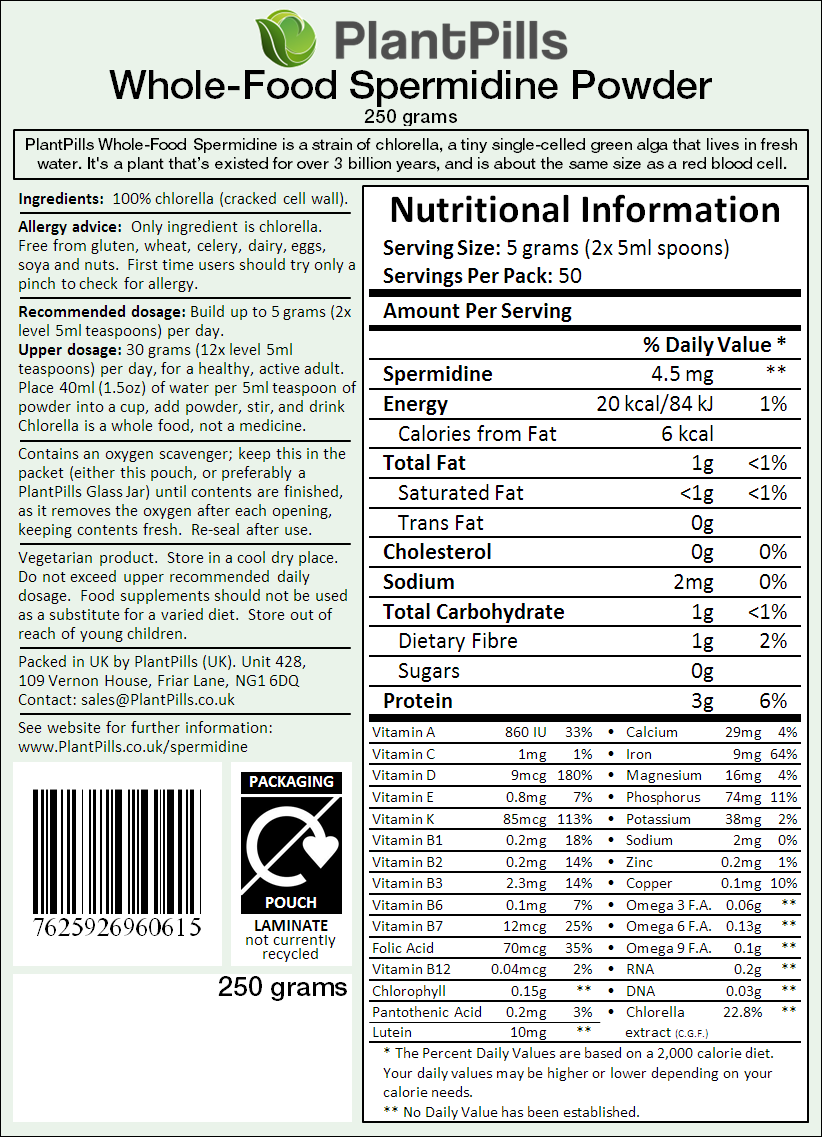
PlantPills Whole-Food Spermidine comes in two versions, the powder form and the tablet form. The tablets are 100% chlorella powder (never any excipients, anti-caking agents, binders or fillers) pressed into tablets, and are in a form that some people may find more convenient to consume.
Tablets are more suited to those that do not like the taste of chlorella powder, or those who take it on the move, and can’t easily measure and mix powder into water.
Powder is more suited to those that have difficulty swallowing tablets, or otherwise find it more convenient to consume as a drink.
From a scientific perspective, powder offers a much higher surface area available immediately higher up in the digestive tract, which may result in increased or more efficient absorption of spermidine.
Spermidine rich diets ameliorate the functional decline of kidneys in animal models of aging and hypertension[37,38], but toxic products and by-products can’t be processed properly in people with chronic kidney failure[39], generally accepted to be 15% of normal function[40]. This suggests that spermidine may be beneficial for people with declining kidney function, but not beneficial if function drops below 15% and is classified as kidney failure.
Anyone with chronic kidney failure should seek professional medical advice before considering supplementation with chlorella.
Anyone who has a seafood allergy may be particularly sensitive to chlorella.
Most people will experience detox symptoms when first taking chlorella.
Individuals lacking the digestive enzyme cellulase may not be able to tolerate chlorella. In such cases it is advisable to take a digestive enzyme supplement that contains cellulase to help digest foods such as chlorella.
PlantPills chlorella is amongst the most nutritious in the world, so if you are switching from using a different brand of chlorella, it would be sensible to take half your normal dose to begin with and adjust the dosage from there.
Chlorella contains B vitamins which are linked to increased energy. Some people may experience difficulty in sleeping if taking a large dose of chlorella just before bed.
It is easier on the digestive system to take chlorella separately from milk or other dairy products such as yoghurt or cheese.
Persons taking the blood-thinning drug known as Coumadin (generic warfarin) are advised to completely avoid chlorella, or use caution and follow the advice of their healthcare professional because chlorella contains high amounts of vitamin K that may affect the inhibition of blood clots.
Chlorella may cause the immune system to become more active, and this could increase the symptoms of autoimmune diseases. If you have one of these conditions, it’s best to avoid using chlorella.
It is never advisable to start taking a new food supplement such as chlorella during pregnancy.
Please find all sources and references listed below. Please note that none of these sources are affiliated with PlantPills.
| 1 |
Modulation of cellular function by polyamines. Igarashi K, Kashiwagi K. Int J Biochem Cell Biol. 2010. 42:39–51. |
| 2 |
Functions of polyamines in mammals. A. E. Pegg J. Biol. Chem. 291, 14904–14912 (2016). doi: 10.1074/jbc. R116.731661; pmid: 27268251 |
| 3 |
The importance of dietary polyamines in cell regeneration and growth S. Bardócz et al. Br. J. Nutr. 73, 819–828 (1995). doi: 10.1079/BJN19950087; pmid: 7632663 |
| 4 |
Modulation of cellular function by polyamines
K. Igarashi, K. Kashiwagi Int. J. Biochem. Cell Biol. 42, 39–51 (2010). doi: 10.1016/j.biocel.2009.07.009; pmid: 19643201 |
| 5 |
Modulation of learning and memory by natural polyamines.
G. P. Guerra, M. A. Rubin, C. F. Mello Pharmacol. Res. 112, 99–118 (2016). doi: 10.1016/j.phrs.2016.03.023; pmid: 27015893 |
| 6 |
Induction of autophagy by spermidine promotes longevity.
T. Eisenberg et al. Nat. Cell Biol. 11, 1305–1314 (2009). doi: 10.1038/ncb1975; pmid: 19801973 |
| 7 |
Autophagy and aging.
Rubinsztein DC, Marino G, Kroemer G. Autophagy and aging. Cell. 2011. 146:682–95. |
| 8 |
Polyamines in foods: development of a food database Ali, Mohamed Atiya; Poortvliet, Eric; Strömberg, Roger; Yngve, Agneta. Food Nutr Res. 2011, 55: 5572. doi:10.3402/fnr.v55i0.5572. PMC 3022763. PMID 21249159 |
| 9 |
Brochure on Polyamines, rev. 2 (PDF) Japan: Oryza Oil & Fat Chemocial Co., Ltd. 2011-12-26. PDF file |
| 10 |
Higher spermidine intake is linked to lower mortality: a prospective population-based study Stefan Kiechl, Raimund Pechlaner, Peter Willeit, Marlene Notdurfter, Bernhard Paulweber, Karin Willeit, Philipp Werner, Christoph Ruckenstuhl, Bernhard Iglseder, Siegfried Weger, Barbara Mairhofer, Markus Gartner, Ludmilla Kedenko, Monika Chmelikova, Slaven Stekovic, Hermann Stuppner, Friedrich Oberhollenzer, Guido Kroemer, Manuel Mayr, Tobias Eisenberg, Herbert Tilg, Frank Madeo, Johann Willeit The American Journal of Clinical Nutrition, Volume 108, Issue 2, August 2018, Pages 371–380, https://doi.org/10.1093/ajcn/nqy102 Clinical trials data |
| 11 |
Induction of autophagy by spermidine promotes longevity Eisenberg T, Knauer H, Schauer A, Buttner S, Ruckenstuhl C, Carmona-Gutierrez D, Ring J, Schroeder S, Magnes C, Antonacci L, et al. Nat Cell Biol 2009;11:1305-14. |
| 12 |
Spermidine Prolongs Lifespan and Prevents Liver Fibrosis and Hepatocellular Carcinoma by Activating MAP1S-Mediated Autophagy Yue F, Li W, Zou J, Jiang X, Xu G, Huang H, Liu L. Cancer Res 2017;77:2938-51. |
| 13 |
Cardioprotection and lifespan extension by the natural polyamine spermidine Eisenberg T, Abdellatif M, Schroeder S, Primessnig U, Stekovic S, Pendl T, Harger A, Schipke J, Zimmermann A, Schmidt A, et al. Nat Med 2016;22:1428-38. |
| 14 |
Induction of autophagy by spermidine promotes longevity
T. Eisenberg et al. Nat. Cell Biol. 11, 1305–1314 (2009). doi: 10.1038/ncb1975; pmid: 19801973 |
| 15 |
Spermidine and spermine are enriched in whole blood of nona/centenarians S. Pucciarelli et al. Rejuvenation Res. 15, 590–595 (2012). doi: 10.1089/rej.2012.1349; pmid: 22950434 |
| 16 |
Restoring polyamines protects from ageinduced memory impairment in an autophagy-dependent manner.
V. K. Gupta et al. Nat. Neurosci. 16, 1453–1460 (2013). doi: 10.1038/nn.3512; pmid: 23995066 |
| 17 |
Polyamines in mammalian ageing: An oncological problem, too? A review.
G. Scalabrino, M. E. Ferioli Mech. Ageing Dev. 26, 149–164 (1984). doi: 10.1016/0047-6374(84)90090-3; pmid: 6384679 |
| 18 |
Decrease in polyamines with aging and their ingestion from food and drink.
K. Nishimura, R. Shiina, K. Kashiwagi, K. Igarashi J. Biochem. 139, 81–90 (2006). doi: 10.1093/jb/mvj003; pmid: 16428322 |
| 19 |
Long-term oral polyamine intake increases blood polyamine concentrations.
K. Soda et al. J. Nutr. Sci. Vitaminol. (Tokyo) 55, 361–366 (2009). doi: 10.3177/jnsv.55.361; pmid: 19763038 |
| 20 |
Polyamines in foods: Development of a food database. M. Atiya Ali, E. Poortvliet, R. Strömberg, A. Yngve Food Nutr. Res. 55, (2011). doi: 10.3402/fnr.v55i0.5572; pmid: 21249159 |
| 21 |
Development of a polyamine database for assessing dietary intake.
C. Zoumas-Morse et al. J. Am. Diet. Assoc. 107, 1024–1027 (2007). doi: 10.1016/j.jada.2007.03.012; pmid: 17524725 |
| 22 |
Spermidine in health and disease Frank Madeo, Tobias Eisenberg, Federico Pietrocola, Guido Kroemer Science, 26 January 2018 |
| 23 |
Metabolic control of longevity C. López-Otín, L. Galluzzi, J. M. P. Freije, F. Madeo, G. Kroemer Cell 166, 802–821 (2016). doi: 10.1016/j.cell.2016.07.031; pmid: 27518560 |
| 24 |
Extending healthy life span—From yeast to humans
L. Fontana, L. Partridge, V. D. Longo Science 328, 321–326 (2010). doi: 10.1126/science.1172539; pmid: 20395504 |
| 25 |
The Effects of Calorie Restriction on Autophagy: Role on Aging Intervention Ki Wung Chung and Hae Young Chung Nutrients 2019 |
| 26 |
Caloric restriction mimetics: Towards a molecular definition
F. Madeo, F. Pietrocola, T. Eisenberg, G. Kroemer Nat. Rev. Drug Discov. 13, 727–740 (2014). doi: 10.1038/nrd4391; pmid: 25212602 |
| 27 |
Resveratrol Increases Intracellular NAD+ Levels Through Up regulation of The NAD+ Synthetic Enzyme Nicotinamide Mononucleotide Adenylyltransferase Ross S. Grant University of New South Wales, Pharmacology, 5 May 2010 |
| 28 |
Spermidine and resveratrol induce autophagy by distinct pathways converging on the acetylproteome E. Morselli et al. J. Cell Biol. 192, 615–629 (2011). |
| 29 |
Spermidine and spermine are enriched in whole blood of nona/centenarians.
S. Pucciarelli et al. Rejuvenation Res. 15, 590–595 (2012). doi: 10.1089/rej.2012.1349; pmid: 22950434 |
| 30 |
Are milk polyamines preventive agents against food allergy? Dandrifosse G, Peulen O, El Khefif N, Deloyer P, Dandrifosse AC, Grandfils C. Proc Nutr Soc. 2000;59(1):81-86. doi:10.1017/s0029665100000100 |
| 31 |
Essential role for autophagy in lifespan extension. Madeo, F., Zimmermann, A., Maiuri, M.C. & Kroemer, G. J. Clin. Invest. 125, 85–93 (2015). |
| 32 |
Restoring polyamines protects from age-induced memory impairment in an autophagy-dependent manner. Gupta, V.K. et al. Nat. Neurosci. 16, 1453–1460 (2013). |
| 33 |
Spermidine protects against α-synuclein neurotoxicity. Büttner, S. et al. Cell Cycle 13, 3903–3908 (2014). |
| 34 |
Autophagy activators rescue and alleviate pathogenesis of a mouse model with proteinopathies of the TAR DNA-binding protein 43. Wang, I.-F. et al. Proc. Natl. Acad. Sci. USA 109, 15024–15029 (2012). |
| 35 |
Cardioprotection and lifespan extension by the natural polyamine spermidine. Eisenberg, T., Abdellatif, M., Schroeder, S. et al. Nat Med 22, 1428–1438 (2016). https://doi.org/10.1038/nm.4222 |
| 36 |
Circadian Clock Control by Polyamine Levels through a Mechanism that Declines with Age Zwighaft, Ziv et al. Cell Metabolism, Volume 22, Issue 5, 874 - 885 |
| 37 |
Circadian clock control by polyamine levels through a mechanism that declines with age. Z. Zwighaft et al. Cell Metab. 22, 874–885 (2015). doi: 10.1016/j.cmet.2015.09.011; pmid: 26456331 |
| 38 |
Polyamine-rich food decreases age-associated pathology and mortality in aged mice. K. Soda, Y. Dobashi, Y. Kano, S. Tsujinaka, F. Konishi Exp. Gerontol. 44, 727–732 (2009). doi: 10.1016/j.exger.2009.08.013; pmid: 19735716 |
| 39 |
Polyamines in renal failure.
K. Igarashi, S. Ueda, K. Yoshida, K. Kashiwagi Amino Acids 31, 477–483 (2006). doi: 10.1007/s00726-006-0264-7; pmid: 16554974 |
| 40 |
The National Institute of Diabetes and Digestive and Kidney Diseases Link |
| 41 |
Regulation of autophagy by cytosolic acetylcoenzyme G. Mariño et al. A. Mol. Cell 53, 710–725 (2014). doi: 10.1016/j.molcel.2014.01.016; pmid: 24560926 |
| 42 |
Spermidine promotes human hair growth and is a novel modulator of human epithelial stem cell functions. Ramot Y, Tiede S, Bíró T, Abu Bakar MH, Sugawara K, Philpott MP, Harrison W, Pietilä M, Paus R. PLoS One. 2011;6(7):e22564. doi: 10.1371/journal.pone.0022564. Epub 2011 Jul 27. PMID: 21818338; PMCID: PMC3144892. |
| 43 |
The metabolomic signature of extreme longevity: naked mole rats versus mice. Viltard M, Durand S, Pérez-Lanzón M, Aprahamian F, Lefevre D, Leroy C, Madeo F, Kroemer G, Friedlander G. Aging (Albany NY). 2019 Jul 24;11(14):4783-4800. doi: 10.18632/aging.102116. PMID: 31346149; PMCID: PMC6682510. |
| 44 |
Spermidine: a physiological autophagy inducer acting as an anti-aging vitamin in humans? Madeo F, Bauer MA, Carmona-Gutierrez D, Kroemer G. Autophagy. 2019 Jan;15(1):165-168. doi: 10.1080/15548627.2018.1530929. Epub 2018 Oct 11. PMID: 30306826; PMCID: PMC6287690. |
| 45 |
Molecular Basis of the ‘Anti-Aging' Effect of Spermidine and Other Natural Polyamines - A Mini-Review. Minois N Gerontology 2014;60:319-326. doi: 10.1159/000356748 |
| 46 |
The effect of salt stress on polyamine biosynthesis and content in mung bean plants and in halophytes. Friedman R, Altman A, Levin N. Physiol Plant. 1989;76:295–302. |

To purchase the PlantPills Whole-Food Spermidine, please see the desktop version of this page here.
